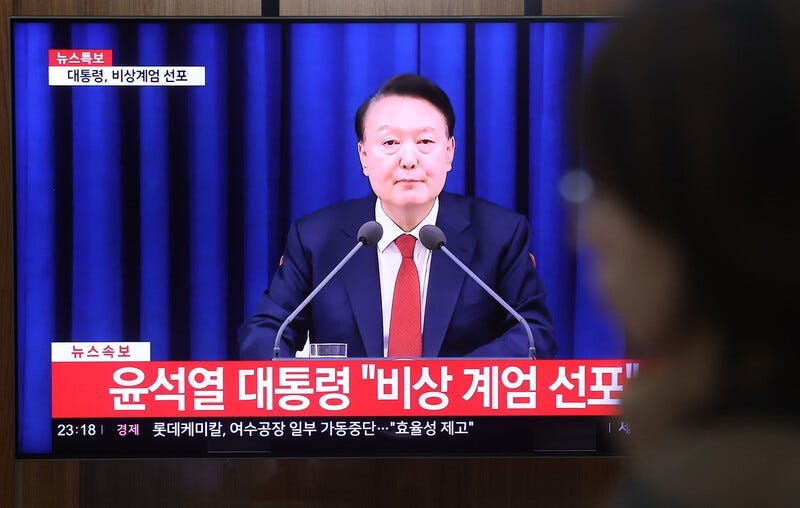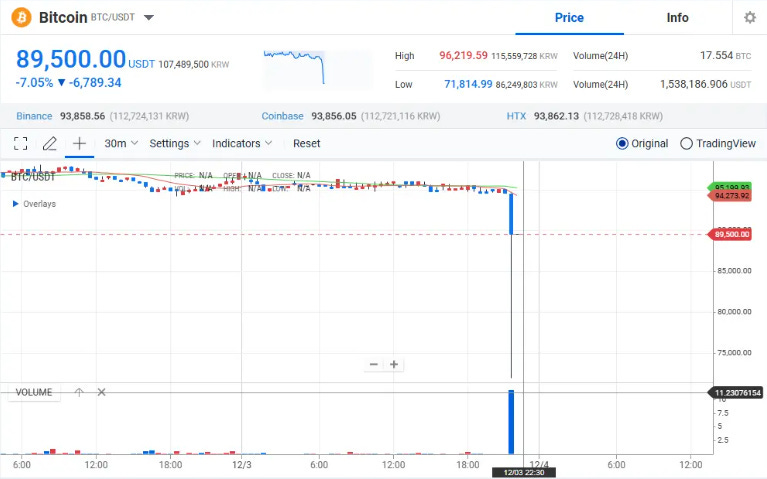This opinion article excludes political opinions on the recent martial law situation in South Korea. It only focuses on the impact and near-term prospects of the blockchain and cryptocurrency investment market.

-
Market shock: The declaration of martial law triggered a massive sell-off on local cryptocurrency exchanges. The sale totaled approximately $33.3 billion. Bitcoin price fell to $62.3k and the local market briefly recorded the highest trading volume in the world.
-
Exodus of investors: Price instability and system outages on local exchanges are expected to push Korean investors towards foreign exchanges and DeFi platforms.
-
Industry Shrinkage: Political instability is pushing Korean blockchain projects to relocate abroad. Key legislation, including the Virtual Asset User Protection Act, will likely face delays.


President Yoon Seok-yul’s sudden declaration and lifting of martial law last night sent shockwaves through the South Korean cryptocurrency market. The price of Bitcoin fell to $62.3 thousand on Upbit, the country’s largest exchange. Upbit and Bithumb, South Korea’s two major exchanges, recorded 24-hour trading volumes of $26.9 billion and $6.4 billion, their highest levels this year. These figures reflect a sell-off by South Korean investors after the statement. During this period, South Korean exchanges briefly ranked first in the world in terms of trading volume. This highlights the extreme volatility of the Korean market.
The martial law situation has seriously damaged confidence in Korean won-denominated assets. Instability in stock and bond markets is likely to increase as foreign capital leaves the country. As a result, investors are turning to decentralized assets like cryptocurrencies.
Faced with increasing geopolitical risks, investors are turning to cryptocurrencies to protect their assets. Bitcoin and other major cryptocurrencies attract interest because they operate independently of government control. During past crises, such as the protests in Hong Kong and the war between Russia and Ukraine, cryptocurrencies have served as safe havens.
South Korea’s cryptocurrency exchanges maintain high security through strict travel rules and KYC (Know Your Customer) regulations. The Act on Reporting and Use of Certain Financial Transaction Information strengthened anti-money laundering (AML) measures. It also improved investor protection. These efforts have positioned Korea as a leader in regulatory compliance.

However, the accident revealed the double-edged effect of stricter regulations. Strict rules have maintained the reverse bounty of Kimchi. This has widened the price gap with global markets and made rational decisions more difficult for investors.
The sharp drop in prices and the instability of the system on local stock exchanges have damaged investor confidence. Upbit and Bithumb experienced server outages due to a day-to-day trading volume of $33.3 billion. Unlike foreign stock markets, this instability has made local stock markets appear unreliable to investors.
These issues are expected to accelerate the migration of South Korean investors to foreign exchanges and DeFi platforms. Binance and Coinbase offer stable trading environments and diversified financial products. These characteristics make them attractive options for South Korean investors.
Political instability is expected to harm the investment climate for blockchain projects in South Korea. Many major projects have already been transferred abroad and this trend is expected to continue. Nexon’s blockchain arm, Nexspace, has moved to Abu Dhabi. Klaytn and LINE Finschia’s Kaia Foundation have moved to Singapore. Wemade’s Wemix has moved to Dubai. These companies chose blockchain-friendly countries to avoid regulatory uncertainty and political risks in South Korea. Other projects are expected to move to Singapore and the United Arab Emirates, where regulations remain clear and stable.
The relocation of blockchain startups abroad is raising concerns about a potential brain drain. This trend could weaken the competitiveness of South Korea’s blockchain industry. As Web3 and blockchain technologies advance rapidly, the loss of talent could have long-term negative effects on Korea’s technological lead. This exodus deepens the sense of crisis within the industry.
The impeachment issue is also expected to delay major legislation. Laws like the law on the protection of users of virtual assets, currently under discussion in the National Assembly, risk experiencing setbacks. These delays could further hamper the institutionalization of the South Korean cryptocurrency market.
The martial law situation has exposed the structural weaknesses of the South Korean cryptocurrency market. Overnight, $33.3 billion in transaction value disappeared and the servers of major exchanges were down. Extreme price volatility occurred, with significant price deviations from global exchanges. These events have highlighted the political risks of the market and the fragility of the current trading system under stress.
Market instability is expected to continue in the short term. However, with appropriate institutional and systemic improvements, this could be a turning point. Such efforts could strengthen the stability of Korea’s cryptocurrency ecosystem and promote globalization. The direction of future developments deserves special attention.
Read more reports related to this research.This report has been prepared on the basis of documents deemed reliable. However, we do not expressly or implicitly guarantee the accuracy, completeness or adequacy of the information. We accept no liability for any loss arising from the use of this report or its contents. The conclusions and recommendations in this report are based on information available at the time of preparation and are subject to change without notice. All plans, estimates, forecasts, objectives, opinions and views expressed in this report are subject to change without notice and may differ from or be contrary to the opinions of other people or other organizations.
This material is provided for informational purposes only and should not be relied upon as legal, business, investment or tax advice. Any reference to securities or digital assets is for illustrative purposes only and does not constitute an investment recommendation or an offer to provide investment advisory services. This material is not directed at investors or potential investors.
Tiger Research permits fair use of its reports. “Fair use” is a principle that broadly allows the use of specific content for purposes of public interest, provided that this does not detract from the commercial value of the material. If use is consistent with the intent of fair use, the reports may be used without prior permission. However, when citing Tiger Research reports, it is mandatory to 1) clearly state “Tiger Research” as the source, 2) include the Tiger Research logo (Black/White). If the material is to be restructured and published, separate negotiations are necessary. Unauthorized use of the reports may result in legal action.




